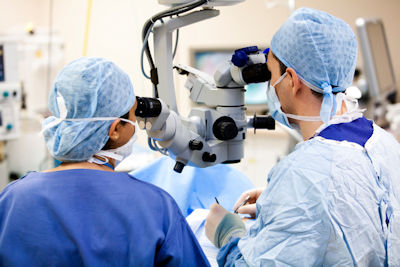Cataract Surgery Recovery Time & Precautions
If you have severe cataracts, you likely have already experienced the signs. Perhaps your vision has become blurry and you feel like colors seem faded. Perhaps you feel as if you’re looking through a waterfall. Perhaps driving at night has become quite difficult. Surgery is the only remedy for cataracts, but you are probably wondering about cataract surgery recovery time and precautions.
At Elmquist Eye Group, our cataract doctors are leading the standard in cataract care. We want to answer all your questions about cataract surgery.
Why Do People Get Cataracts?
 Contrary to popular belief, cataracts are not a disease. Instead, cataracts form as a normal part of aging; the proteins in the eye begin to break down, clump on the lens, and create vision issues. More than 50 percent of people over age 60 have cataracts, but many are not severe enough at this age to cause issues.
Contrary to popular belief, cataracts are not a disease. Instead, cataracts form as a normal part of aging; the proteins in the eye begin to break down, clump on the lens, and create vision issues. More than 50 percent of people over age 60 have cataracts, but many are not severe enough at this age to cause issues.
In fact, as people grow older, nearly everyone will develop cataracts at some point, either in one or both eyes. By age 75, most people are experiencing significant interference with their vision. Today, more than 25 million Americans currently have cataracts, and that number will rise as the aging population grows.
What Causes Cataracts?
As we age, the natural proteins in the eye begin to clump together, cloud the lens and interfere with light’s ability to pass through the eye to the retina. Reading, watching television and night driving will likely become more difficult.
What Is Cataract Surgery?
Cataracts can only be corrected with surgery. At Elmquist, we perform cataract surgery as an outpatient procedure that takes less than an hour. During the surgery, the cloudy natural lens is removed and replaced with a clear artificial lens called an intraocular lens implant (IOL). The IOL then functions just as your natural lens would. You won’t feel it at all. We can even implant IOL to correct vision. We secure the IOL by using a a small incision that heals on its own, so you won’t have stitches, and that makes the healing process much easier.
What Precautions Should I Take?
We will only do one eye at a time. You will need someone to drive you home from the procedure, and you should plan to rest for a couple of days after the surgery. Most patients feel itchiness or sensitivity for a couple of days. By the third day, you can be back to watching TV and reading, but should do so in moderation to not overly stimulate your eye. The day after the procedure, you’ll need to come into the office for a checkup so our doctors can ensure you are healing properly. Most of our patients return to work within two to five days after surgery, and since the procedure does not require stitches, you can resume your normal activities in just a few days.
Come to Elmquist
If you suspect or know you have cataracts, come see our exceptional surgeons at Elmquist Eye Group to discuss recovery time and precautions. Our doctors are board certified or board-eligible by the American Board of Ophthalmology. We offer patients the latest advancements in eye care, and we are ready to help you resolve your cataract issue.
